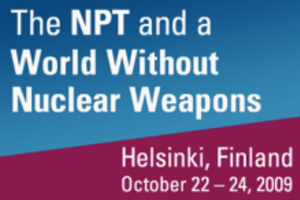
Helsinki, Finland, is the site for a major conference on reducing and eliminating nuclear weapons organized by Notre Dame’s Kroc Institute and the Finnish Institute of International Affairs.
Between Oct. 22-24, policymakers and security experts from around the world will consider ways to strengthen the Nuclear Nonproliferation Treaty (NPT), a cornerstone of the global effort to control nuclear weapons. Their findings and recommendations will be disseminated before the next five-year review of the NPT, scheduled for May 2010 at the United Nations in New York.
Participants in the conference, “The Nuclear Nonproliferation Treaty and a World Without Nuclear Weapons,” include William Perry, former U.S. Secretary of Defense and Professor at Stanford University; Margaret Beckett, Former UK Foreign Secretary; Gareth Evans, former Australian Foreign Secretary and co-chair of the International Conference on Nuclear Nonproliferation and Disarmament; Olli Heinonen, International Atomic Energy Association Deputy Director General; Mohamed I. Shaker, former chair of the UN Committee on Disarmament; Henrik Salander, former Swedish ambassador and chair of the 2002 NPT Preparatory Committee meeting; and James Goodby, former U.S. ambassador.
Conference co-organizer David Cortright, director of policy studies at the Kroc Institute and an expert in nuclear weapons policy, said that while progress toward a world without nuclear weapons will be complicated, “this is a time of renewed hope. For the first time, the leaders of major nuclear states, including the United States and Russia, openly state their desire to reduce and eventually get rid of their nuclear weapons.”
In the past couple of years, prominent policymakers in the United States, United Kingdom, Germany and elsewhere have advanced proposals on how the world could move toward a nuclear weapons-free future. Governments from India to Norway to Russia have expressed their support for the idea, provided various conditions are met. In 2007 and 2008, four members of the U.S. national security establishment — George Shultz, Henry Kissinger, William Perry, and Sam Nunn — published opinion pieces in the Wall Street Journal arguing that the United States must confront growing nuclear dangers by making a clear commitment to a world without nuclear weapons. President Barack Obama has repeatedly stated the United States’ commitment to seek the peace and security of a world without nuclear weapons.
Finland was among the first nations to sign the NPT when it was developed in 1968. The treaty has been signed by 189 nations, five of which — the United States, Russia, the United Kingdom, China, and France — have nuclear weapons. The other nuclear states — India, Israel, Pakistan, and North Korea — are not parties to the treaty. The United States was the first nation to hold nuclear weapons and the only one to have used them (on Hiroshima and Nagasaki in 1945).
Contact: David Cortright, (574) 631-8536, dcortrig@nd.edu